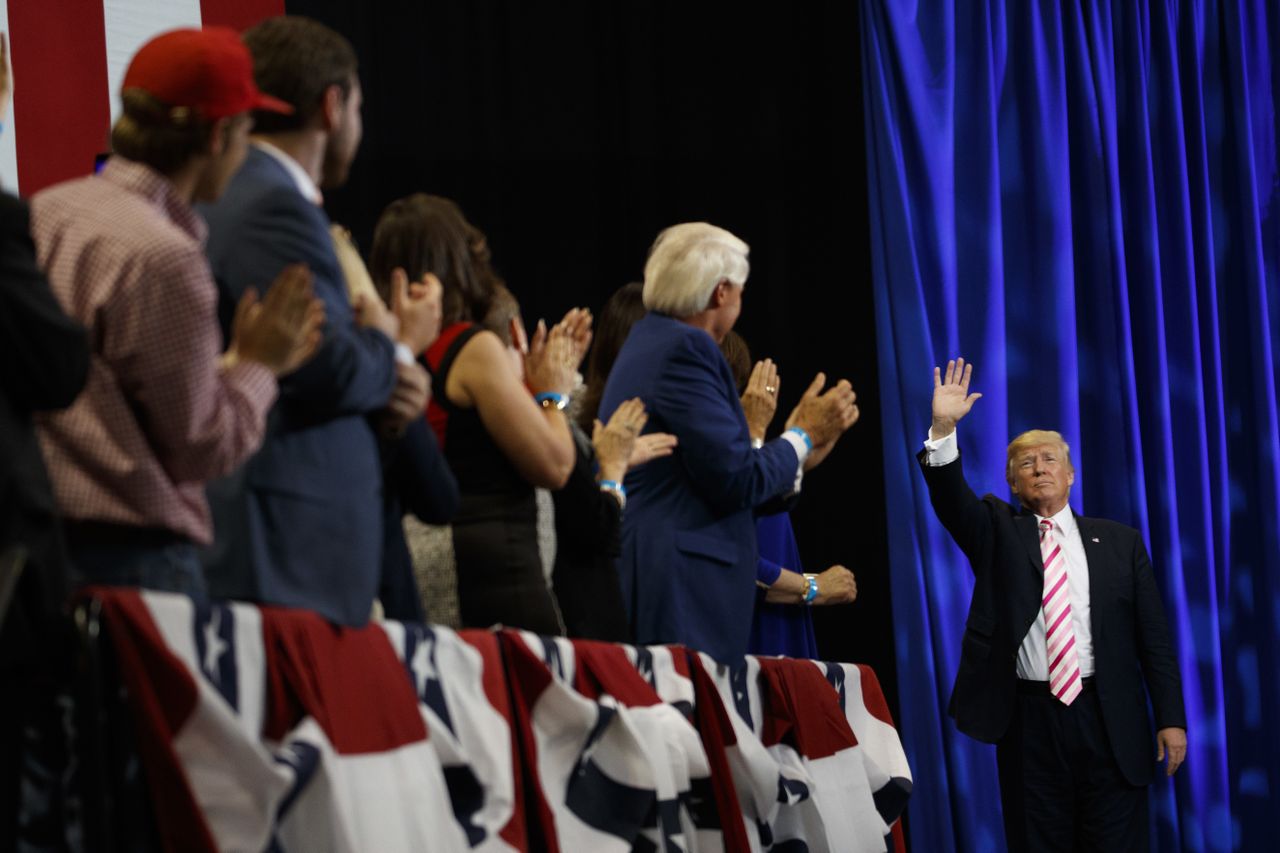Trump's 35 percent doctrine
Donald Trump is president for just 35 percent of America. This is an incredibly audacious experiment in radioactive governance.


President Trump and the Republican Party are conducting a bold experiment in American democracy: ruling for and implementing policy on behalf of just 35 percent of the voting public.
On issue after issue, Republicans are pursuing (although thanks to their world-historic ineptitude, not actually yet achieving) policy goals that are not just divisive in a split-down-the-middle sense, but that are unambiguously opposed by towering majorities of American citizens. For the first time in our history, we have a governing party that seems to believe it can win re-election by implementing policies that are about as popular as parking tickets, and which will be greeted with all of the enthusiasm that we reserve for a bout of Norovirus.
If nothing else, you have to respect the audacity.
Subscribe to The Week
Escape your echo chamber. Get the facts behind the news, plus analysis from multiple perspectives.

Sign up for The Week's Free Newsletters
From our morning news briefing to a weekly Good News Newsletter, get the best of The Week delivered directly to your inbox.
From our morning news briefing to a weekly Good News Newsletter, get the best of The Week delivered directly to your inbox.
The polling is stark, and holds for social or cultural issues as well as substantive economic policies. President Trump himself is on the wrong side of nearly every single major culture war initiative he has pursued. Broad majorities of Americans believe the president tweets too often (69 percent), that his use of the platform at all is a net negative (59 percent), that health insurance should pay for birth control (69 percent), that NFL players should have the right to kneel during the national anthem without being fired (57 percent), and that they can trust the media to tell them the truth (68 percent). On foreign policy, the story is not much different. While President Trump careens and rage-tweets his way to a needless crisis over the Iran deal, Americans want the accord to remain in place (56 percent to 29 percent). Similarly, a decisive majority opposes military action against North Korea (60 percent to 29 percent) and 70 percent believe the president's lunatic posturing and schoolyard name-calling are unhelpful in de-escalating the crisis. Americans disapproved of President Trump's withdrawal from the Paris Agreement by a mile, too (59 percent to 28 percent).
The numbers are much, much worse for the economic agenda being incompetently pressed by a GOP leadership that has seemingly lost the ability to steward legislation through the committee process and onto the floor. The GOP's plan to raise taxes on working people while slashing rates for the Hamptons set debuted at 28 percent support this week, with an overwhelming majority (65 percent) believing that large corporations should pay more in taxes rather than less. The GOP plan: Do the exact opposite of what a 2-1 majority wants.
Why else would his administration rescind the Deferred Action For Childhood Arrivals (DACA) program when 70 percent of respondents want a path to citizenship for the DREAMers? Even Trump's magical, see-through border wall is down to 35 percent. Republicans also plan to cripple the Consumer Financial Protection Bureau and roll back the Dodd-Frank financial reform passed into law under former President Obama, both of which continue to enjoy 74 percent approval from the public. Before it was euthanized behind closed doors last week, the Graham-Cassidy health-care atrocity was polling at 20 percent. Split the difference on undecideds and "don't knows" and you'll probably get somewhere close to what seems to be some kind of holy polling number in Trumpworld: 35 percent — or about what the president himself polls at on his bad days.
There are two possible explanations for why the Republicans are chasing destructive policy goals like a pack of sheep off a very steep cliff. The first is that they believe in a democratic theory called "trustee representation" — the idea that in a democracy, elected officials should feel free to pursue what they believe is in the best interest of society rather than what the public wants at any given time. This was what motivated many Democrats in Congress to vote for the Affordable Care Act in 2010 despite the fact that its public support had collapsed by the time the bill was passed and even though they knew that many of them would lose their seats as a result. Their belief that expanding access to health care was worth their seats and their careers has so far been proven correct.
The framers of the Constitution were famously torn between the trustee model and the alternative of "delegate representation" — that elected officials should try to translate public sentiment into law, and that they should be held accountable when they do things that citizens oppose. The insanely frequent elections to the House, for example, are evidence that the framers believed at least somewhat in delegate representation. But so many of the other procedures and institutions, from the Electoral College to the original procedures for electing U.S. senators, were evidence that the Constitution's architects distrusted the public and sought to empower a class of ruling wise men to temper popular passions.
But don't kid yourself: The GOP isn't making grotesquely unpopular policy after deep-reading the Federalist Papers and chasing it with John Rawls. There is another, simpler explanation, one that is not rooted in a noble, if misguided, reading of democratic theory: The Republican Party of 2017 is a gang of thieves, miscreants, and shameless liars, acting not on any conceivable interpretation of the public good but instead governing in the interest of their donors and their increasingly unhinged base, the sort of people who would elect a lawless theocrat called Roy Moore to one of the 100 or so most important offices in the entire country. They are gambling that their only meaningful challenge is to survive the wrath of their primary voters, who they expect, as the political scientists Justin Fox and Kenneth Shotts wrote in an 2014 paper, to "ignore outcomes, and instead hold incumbents to an ideological litmus test — rewarding them with re-election only if their policy positions signal congruence."
In other words, Republicans are asking their primary voters to treat them like delegate representatives, and the American people to defer to them as trustees.
That's a tough needle to thread even for people who are bright and well-intentioned, which this bunch is not.
The entire theory of trustee representation is based on an assumption that representatives possess some measure of expertise not available to the general public, an argument that is very difficult to make about the contemporary Republican Party, whose preferred policies are not just shunned by the public but also run contrary to prevailing expert opinion in almost every conceivable realm. Pursuing a 15-point policy agenda that the public disapproves of 2-1 and that anyone with any meaningful expertise thinks is a set of looming and interconnected travesties is not some act of political charity designed to protect us from our worst instincts, but rather evidence that the GOP has become so arrogant and so confident in its ability to hold onto office in perpetuity that they literally couldn't care less what we think or how many people their policies will harm.
There remains only one way to convince them to care. Indeed, leaving office in disgrace after an electoral shellacking might be the only possible GOP action a majority of the public will ever support.
Sign up for Today's Best Articles in your inbox
A free daily email with the biggest news stories of the day – and the best features from TheWeek.com
David Faris is an associate professor of political science at Roosevelt University and the author of It's Time to Fight Dirty: How Democrats Can Build a Lasting Majority in American Politics. He is a frequent contributor to Informed Comment, and his work has appeared in the Chicago Sun-Times, The Christian Science Monitor, and Indy Week.
-
 Today's political cartoons - March 30, 2025
Today's political cartoons - March 30, 2025Cartoons Sunday's cartoons - strawberry fields forever, secret files, and more
By The Week US Published
-
 5 hilariously sparse cartoons about further DOGE cuts
5 hilariously sparse cartoons about further DOGE cutsCartoons Artists take on free audits, report cards, and more
By The Week US Published
-
 Following the Tea Horse Road in China
Following the Tea Horse Road in ChinaThe Week Recommends This network of roads and trails served as vital trading routes
By The Week UK Published
-
 The JFK files: the truth at last?
The JFK files: the truth at last?In The Spotlight More than 64,000 previously classified documents relating the 1963 assassination of John F. Kennedy have been released by the Trump administration
By The Week Staff Published
-
 'Seriously, not literally': how should the world take Donald Trump?
'Seriously, not literally': how should the world take Donald Trump?Today's big question White House rhetoric and reality look likely to become increasingly blurred
By Sorcha Bradley, The Week UK Published
-
 Will Trump's 'madman' strategy pay off?
Will Trump's 'madman' strategy pay off?Today's Big Question Incoming US president likes to seem unpredictable but, this time round, world leaders could be wise to his playbook
By Sorcha Bradley, The Week UK Published
-
 Democrats vs. Republicans: who are the billionaires backing?
Democrats vs. Republicans: who are the billionaires backing?The Explainer Younger tech titans join 'boys' club throwing money and support' behind President Trump, while older plutocrats quietly rebuke new administration
By Harriet Marsden, The Week UK Published
-
 US election: where things stand with one week to go
US election: where things stand with one week to goThe Explainer Harris' lead in the polls has been narrowing in Trump's favour, but her campaign remains 'cautiously optimistic'
By Harriet Marsden, The Week UK Published
-
 Is Trump okay?
Is Trump okay?Today's Big Question Former president's mental fitness and alleged cognitive decline firmly back in the spotlight after 'bizarre' town hall event
By Harriet Marsden, The Week UK Published
-
 The life and times of Kamala Harris
The life and times of Kamala HarrisThe Explainer The vice-president is narrowly leading the race to become the next US president. How did she get to where she is now?
By The Week UK Published
-
 Will 'weirdly civil' VP debate move dial in US election?
Will 'weirdly civil' VP debate move dial in US election?Today's Big Question 'Diametrically opposed' candidates showed 'a lot of commonality' on some issues, but offered competing visions for America's future and democracy
By Harriet Marsden, The Week UK Published
